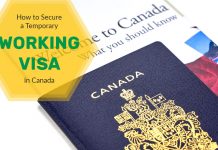Canada Temporary Work Permit Process
Each yr, almost 300,000 foreign workers come to work in Canada on Temporary Work Permits.
Although there are some exceptions, as a common rule, foreign workers require a work permit to work in Canada on a temporary basis.
Obtaining a Canadian temporary work permit is a multi-step procedure that may take a number of weeks. There are quite a few alternative ways to get a work permit. Depending on one’s nationality, occupation, and meant work in Canada, there could also be potentialities for expediting the method.
In order to be granted a temporary work permit, Canadian employers will want to present foreign workers with both approvals from Employment and Social Development Canada (ESDC) or an Offer of Employment quantity issued by Immigration, Refugee and Citizenship Canada (IRCC).
Depending on their nation of citizenship, foreign workers may have to acquire a Temporary Resident Visa (TRV) to move to Canada.
- Step 1: Employer applies for both Labour Market Impact Assessment or Labour Market Impact Assessment Exemption, if crucial.
- Step 2: Employer extends Temporary Job Offer.
- Step three: Foreign Worker applies for Work Permit.
- Step four: Work Permit is issued.
Step 1: Employer applies for Labour Market Impact Assessment, if crucial.
Canadian employers who want to rent short-term foreign employees should acquire a permit or constructive Labour Market Impact Assessment (LMIA) from ESDC, which is issued if ESDC is happy that there isn’t a Canadian citizen or permanent resident obtainable to do the job.
Further, if the Canadian employer is hiring for a place situated in the province of Quebec, the foreign employee will want to acquire a Certificat d’acceptation du Québec (CAQ) in order to work quickly in Quebec. The CAQ application may have to be submitted to Quebec’s Ministère de l’Immigration, Francisation et de l’Intégration (MIFI) concurrently the LMIA is submitted to ESDC.
ESDC and MIFI have made it obtainable to employers a streamlined LMIA step to fill chosen positions in Quebec without having to embrace proof of recruitment efforts.
In a restricted variety of conditions, foreign workers could acquire a work permit without the necessity for an LMIA. These work permits are usually referred to as LMIA Exempt Work Permits and include the following:
- International agreements, such because the North American Free Trade Agreement (NAFTA), Comprehensive Economic and Trade Agreement (CETA), or Comprehensive and Progressive Agreement for Trans-Pacific Partnership (CPTPP);
- Canadian curiosity:
- As a result of important financial, social, or cultural advantages to Canadians;
- As a result of reciprocal agreements Canada and its provinces/territories have entered into with different nations, reminiscent of youth and instructor change packages;
- To permit worldwide college students finding out in Canada to fulfill educational necessities referred to as co-op placements;
- To permit the accompanying spouses/common-law companions of sure work permit and Study Permit holders residing in Canada to work in Canada;
- To permit for charitable or non secular work;
- In recognition that sure individuals in Canada for causes apart from the above-mentioned, such because the making of a refugee declare, want to assist themselves;
- Certain everlasting residence candidates in Canada;
- Certain migrant workers and their dependents in Canada on employer-specific work permits who are experiencing abuse, or who are liable to abuse.
Once a constructive or impartial LMIA is granted, the Canadian employer should present a duplicate of the LMIA approval letter together with an in-depth job offer letter to the foreign employee, who will need this paperwork to apply for a work permit.
Step 3: Foreign Worker applies for Work Permit.
With the LMIA approval letter, the job offer letter (and the CAQ if relevant), the foreign employee can submit an application for a Canadian short-term work permit to IRCC. Depending on their nation of citizenship, the foreign employee may have to acquire a TRV to move to Canada, and would due to this fact want to submit the temporary work permit application at a Canadian visa workplace overseas.
Step 4: Work Permit is issued.
The Canadian temporary work permit shall be issued on the level of entry by a Canada Border Services Agency (CBSA) officer on the time the foreign employee arrives in Canada.
A temporary work permit could also be issued for a time period starting from a couple of days to a couple of years.
Most Canadian work permits are employer particular, in any other case referred to as “closed” work permits, and are granted for a particular job in Canada. Consequently, a foreign employee could solely work for the employer specified on the work permit. As such, if the foreign employee finds unique employment and doesn’t but have permanent resident standing, the foreign employee should apply for and obtain a brand new work permit prior to altering employers or their place in Canada.
Work in Canada: Basic Facts
- For Canadian immigration functions the definition of “work” may be very broad and is outlined as an exercise for which wages are paid or fee is earned, or that competes instantly with actions of Canadian residents or everlasting residents in the Canadian labour market, irrespective of the period of the meant exercise.
- Generally, Canadian immigration authorities will grant a work permit provided that supported by a LMIA approval letter issued by ESDC, indicating that the proposed employment is not going to adversely have an effect on Canadian workers.
- In most circumstances a job provide from a Canadian employer is required to apply for a Canadian Work Permit.
- In restricted conditions, Canadian immigration rules permit for Open Work Permits, which are not employer-specific.
- A work permit is at all times short-term in nature, however can usually be prolonged from inside Canada.

